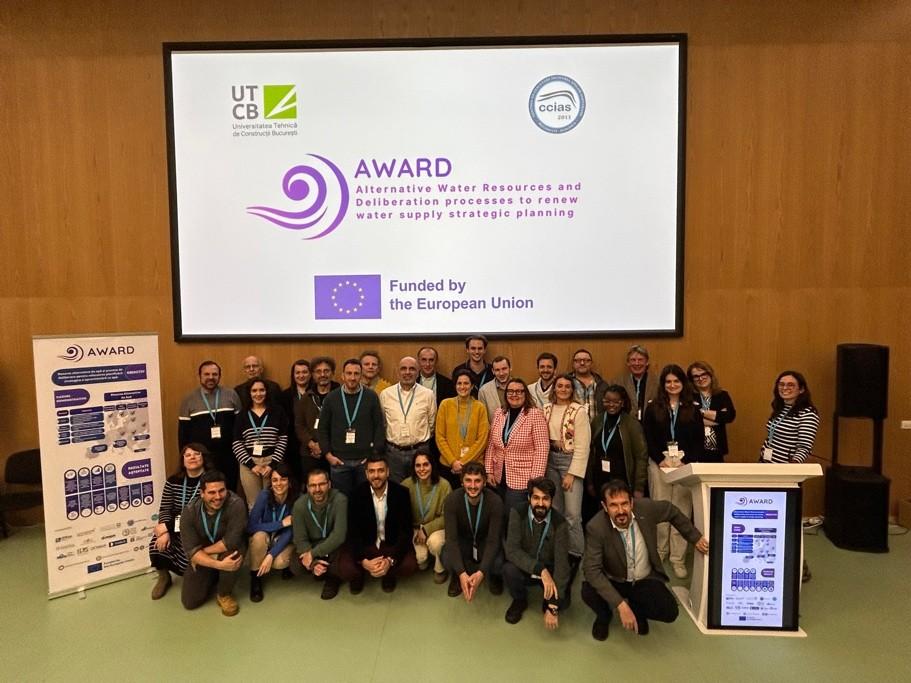The AWARD_HEU General Assembly recently took place in Bucharest, Romania, gathering key partners to discuss progress and next steps in sustainable water management. Hosted by the Universitatea Tehnică de Construcții București (UTCB), this multi-day event featured a series of in-depth presentations, strategic discussions, and insightful field visits. The event fostered strong collaboration and innovation in the field of Alternative Water Resources (AWRs), reinforcing the project's mission to develop sustainable water solutions across Europe.
Day 1: Setting the Stage for Sustainable Water Management
The General Assembly commenced with Work Package Leaders outlining key challenges and objectives related to AWRs. Discussions highlighted the increasing necessity of sustainable water solutions in Europe and the critical role of the AWARD project in addressing these pressing challenges.
The Tranversal Interest Group (TIG) provided a comprehensive overview of the Demo Cases, detailing the progress made, key lessons learned, and the steps required for future developments. These exchanges set the foundation for a productive assembly, reinforcing the commitment of all stakeholders involved. The first day was marked by dynamic conversations and shared ambitions, shaping a collective vision for the project’s future trajectory.
Day 2: Focus on Demonstration Cases
A significant highlight of the second day was the in-depth exploration of Demonstration Case #1: "Circus Lake" Urban Park in Bucharest. Romanian partners from UTCB presented valuable insights into the specific characteristics of the site, assessments conducted on Lake Tei, and the environmental and technical challenges associated with implementing AWRs. These discussions illustrated the complexities of integrating alternative water solutions into urban landscapes and underscored the necessity of tailored approaches that account for local ecological and infrastructural factors.
In the afternoon, Work Package (WP) and Demo Case (DC) leaders collaborated to establish a structured roadmap for cross-cutting activities in the coming months and years. Their goal was to ensure alignment between different aspects of the project and optimize resource allocation for maximum impact. Additionally, Raluca MIHAI from Business Development Group Romania (BDG) delivered an insightful presentation on a study examining social acceptance and awareness of AWRs in Romania and Moldova. The findings emphasized the importance of public engagement and education in fostering long-term acceptance and successful implementation of alternative water resource strategies.
Day 3: Policy and Governance Perspectives
The third day opened with a working session led by BDG, focusing on policy support efforts for AWRs. Discussions revolved around how regulatory frameworks and policy interventions can facilitate the widespread adoption of alternative water management solutions. The session underscored the need for an integrated approach that involves policymakers, researchers, and industry stakeholders to create effective, adaptable policies that respond to evolving water management challenges.
Following this, participants attended a presentation on MARCLAIMED and RECREATE, two initiatives within the Alternative Water Resources for Climate cluster, in which AWARD is actively involved. These projects contribute valuable insights into innovative water management strategies and provide synergies that can enhance AWARD’s impact.
A key moment of the day was a presentation by Loup DELADERRIERE and Sofia PEREZ from Université Paris-Saclay, who provided a detailed overview of Work Package 3 (Patrimonial Framework). Their analysis focused on the interplay between societal governance and geopolitical impacts on each Demo Case, stressing the necessity of an interdisciplinary approach to water resource management. Their presentation highlighted the broader implications of AWRs on economic stability, environmental sustainability, and social resilience across Europe.
Conclusion: Strengthening Collaboration for the Future of Water
The General Assembly concluded with an insightful visit to UTCB’s specialized research facilities, including the Lab of Aerodynamics and Wind Engineering and the Lab of Hydraulics and Environmental Protection. These state-of-the-art laboratories provided participants with a first-hand look at the advanced research being conducted to support innovative water management solutions.
Beyond technical demonstrations, the final sessions of the assembly focused on strengthening partnerships and fostering meaningful dialogues with key stakeholders. These interactions facilitated constructive discussions on project outcomes, future collaborations, and potential expansions of AWARD’s initiatives. The exchanges reinforced a shared vision for sustainable water management and underscored the necessity of collective action in tackling Europe’s water challenges.
The AWARD General Assembly proved to be a pivotal event, bringing together experts, policymakers, and researchers to advance innovative solutions in AWRs. With strengthened partnerships, clear strategic goals, and an energized community of stakeholders, the project is well-positioned to make a lasting impact on the future of water management in Europe. The momentum generated during this assembly will propel AWARD toward new achievements and groundbreaking advancements in the field.
